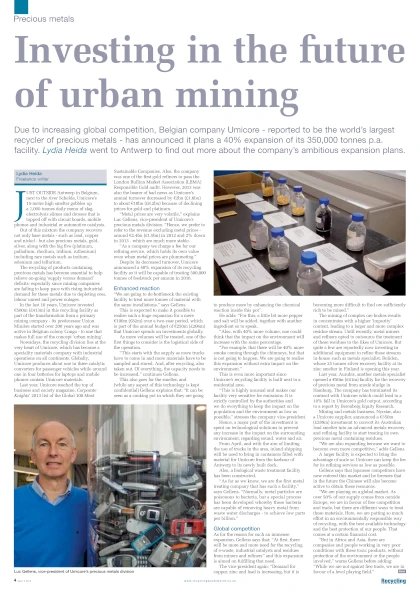Investing in the future of urban mining
Due to increasing global competition, Belgian company Umicore - reported to be the world’s largest recycler of precious metals - has announced it plans a 40% expansion of its 350,000 tonnes p.a. facility. Lydia Heida went to Antwerp to find out more about the company’s ambitious expansion plans.
Just outside Antwerp in Belgium, next to the river Schelde, Umicore’s 15-metre high smelter gobbles up
a 1,000 tonnes daily menu of slag, electrolysis slimes and drosses that is topped off with circuit boards, mobile
phones and industrial or automotive catalysts.
Out of this mixture the company recovers not only base metals - such as lead, copper and nickel - but also precious metals, gold, silver, along with the big five (platinum, palladium, rhodium, iridium, ruthenium), including rare metals such as indium,
selenium and tellurium.

Precious metals
The recycling of products containing precious metals has become essential to help
relieve ongoing ‘supply versus demand’ deficits; especially since mining companies are failing to keep pace with rising industrial
demand for these metals due to depleting ores, labour unrest and power outages.
In the last 10 years, Umicore invested €500m (£413m) in this recycling facility as part of the transformation from a primary
mining company - its predecessor Union Minière started over 200 years ago and was active in Belgium colony Congo - to one that
makes full use of the concept ‘urban mining’.
Nowadays, the recycling division lies at the very heart of Umicore, which has become a speciality materials company with industrial
operations on all continents. Globally, Umicore produces about one in three catalytic
converters for passenger vehicles while around one in four batteries for laptops and mobile phones contain Umicore materials.
Plummeting prices
Last year, Umicore reached the top of business and society magazine, Corporate
Knights’ 2013 list of the Global 100 Most sustainable Companies. Also, the company was one of the first gold refiners to pass the
London Bullion Market Association (LBMA)
Responsible Gold audit.
However, 2013 was
also the bearer of bad news as Umicore’s annual turnover decreased by €2bn (£1.6bn)
to about €10bn (£8.2bn) because of declining
prices for gold and platinum.
“Metal prices are very volatile,” explains
Luc Gellens, vice-president of Umicore’s precious metals division. “Hence, we prefer to refer to the revenue excluding metal prices -
around €2.4bn (£1.9bn) in 2012 and 2% down in 2013 - which are much more stable."
“As a company we charge a fee for our refining service, which holds its own value even when metal prices are plummeting.”
40% expansion
Despite its decreased turnover, Umicore
announced a 40% expansion of its recycling facility so it will be capable of treating 500,000 tonnes of feedstock per annum in 2016.
“We are going to de-bottleneck the existing
facility to treat more tonnes of material with the same installations,” says Gellens. This is expected to make it possible to realise such a huge expansion for a mere
€100m (£82m) over a two-year period, which is part of the annual budget of €250m (£206m) that Umicore spends on investments globally.
As more volumes will be treated, one of the first things to consider is the logistical side of the operation. “This starts with the supply as more trucks have to come in and more materials have to be sampled and stored. And, after recycling, also taken out. Of everything, the capacity needs to be increased,” continues Gellens. (...)
Publication: Recycling & Waste World
Date: April 2014
Would you like to read the entire article? If so, please let me know!
CONTACT MEMoney to burn | Converting flare gas into fuel
Read More

Scarce by nature

Nanomaterials: a new threat to the recycling industry?
Interested in working together?
I'd love to hear from you.